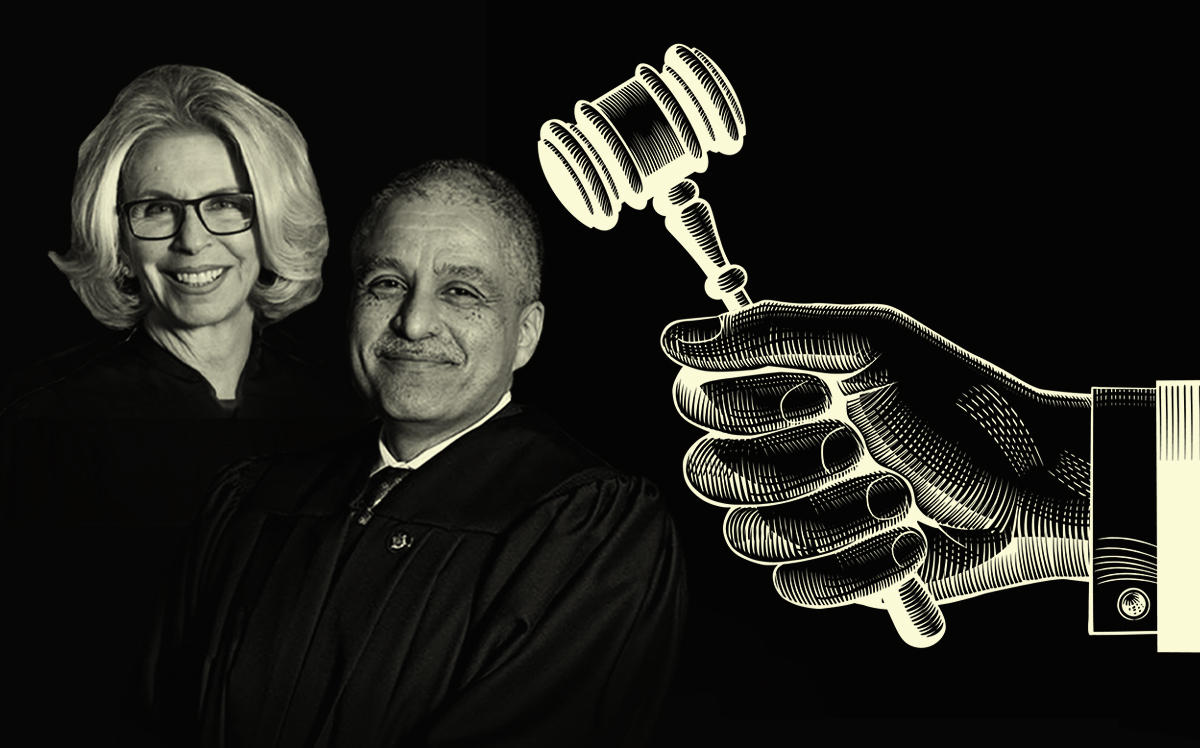A landmark decision from New York’s highest court has elated landlords, while tenants say it puts property before people.
The Court of Appeals — the state’s court of last resort — found that retroactively applying a portion of the Housing Stability and Tenant Protection Act of 2019 to rent-overcharge cases violates the substantive due-process clause of the state constitution, which demands laws be “rationally related to a legitimate government interest.”
The court ruled that the June 2019 rent law, in applying itself to cases that preceded it and having a look-back period longer than four years, did not pass that test.
“The role of the court is often to protect the interest of capital,” charged Dylan Saba, a staff attorney at New York Legal Assistance Group, which has several overcharge cases affected by the decision.
“Courts step in and protect individual liberties — and that’s often what we hear about — but these are unelected bodies who represent the interest of power, no matter what they tell you,” he went on. “The justice system and the courts and powerful elites are showing us that popular organizing will be met with resistance.”
But had one more of the high court’s seven jurists sided with tenants, it would have been landlords lamenting.
Read more


The decision reveals the limits of changing laws to unwind past real estate practices. The 4-3 ruling recognized that the legislature intended the law to be applied retroactively but gave no rationale. In several passages, the majority scolded the legislature for failing to consider the “harsh and destabilizing effect” the new law had on landlords.
“No explanation has been offered, much less a rational one, for retroactive application of the amendment to increase or create liability for rent overcharges that occurred, years – even decades – in the past,” wrote Chief Judge Janet DiFiore in the majority decision.
One property owners’ attorney was surprised by the admonishment of lawmakers.
“This was something I have not seen in past Court of Appeals decisions,” said Nativ Winiarsky, an attorney at Kucker Marino Winiarsky and Bittens. “I think is a tell-tale warning to the legislature that it should not expect the court to simply rubber-stamp its laws, irrespective of how it might impact the substantive and due-process rights of landlords.”
The dissent, penned by Judge Rowan Wilson, denounced the majority’s decision to protect the rights of property owners.
“The amendments to the legislative scheme surrounding rent stabilization reflect the legislature’s judgment, approved by the Governor, about the consequences for landlords who have violated New York law,” wrote Wilson. “In place of that judgment, the majority has substituted its own: the Court must ‘safeguard’ the ‘substantive’ ‘contractual or property rights’ of New York’s landlords.”
The sharp lines of disagreement within the court — with the majority decision calling the dissent “hyperbolic,” and the dissent calling the majority’s role “Frankensteinian” — took observers aback.
Still, Winiarsky called the decision “absolutely monumental and historic” and noted that the legislature may not simply pass an amendment to get around it, because the court deemed the legislation unconstitutional.
The decision could unfreeze the multifamily market, which — coronavirus notwithstanding — has seen few large transactions in months. Potential buyers have struggled to assess liability for litigation, given that potential overcharge claims loomed over many buildings.
Aaron Jungreis, co-founder of multifamily brokerage Rosewood Realty, called the decision “a small victory for landlords in a very unjust pro-tenant environment.” Jungreis brokered one of the few large multifamily transactions in the past year.
The ruling “makes diligencing properties much easier,” said Deborah Riegel, of Rosenberg and Estis. “You still have the same problem that you always had with whether a tenant can come up with a coverable fraud claim. But now you have guidelines.”
Adam Leitman Bailey, principal attorney at his eponymous firm, said some of his clients “literally should be dancing in the streets” because they went from owing many millions of dollars to owing very little.
Tenant advocates and attorneys decried what they saw as a judicial overreach that will discourage new overcharge cases and spoil many pending ones for tenants who expected treble damages. Indeed, the decision affects as many as 1,000 cases, according to Edward Josephson, director of litigation and housing at Legal Services NYC.
“It’s outrageous,” said Josephson. “It says that there’s one kind of justice for the rich and another for the rest.”
Overcharge cases proliferated in the wake of the new rent law, in part because of the increased potential for damages and the look-back period. Dozens were filed in the second half of 2019, an analysis by The Real Deal found.
Ellen Davidson, a staff attorney at the Legal Aid Society, called the decision “incredibly disappointing.”
“The court has clearly decided to look away from years of landlords’ abusive rents and basically given their approval to years of widespread fraud and illegality,” said Davidson, noting that after landlord-friendly reforms were passed in 1997, the Court of Appeals did not intervene to protect tenants’ constitutional rights.
The decision unveiled Thursday sent shockwaves through the tenant movement at a time when many are weighing non-payment of rent and applying for unemployment insurance. Cea Weaver, who coordinated the tenant coalition that won last year’s changes to the rent law said the statute took a big step toward resetting a system that “even landlords say rewards fraud.”
A 2018 investigation by WNBC and TRD showed how state law and lax enforcement allowed landlords to inflate rents with fraudulent renovations and then deregulate those units while receiving a city tax benefit. That system was changed by the new rent law, but overcharge cases from that time will continue to be governed by the previous law.
“This decision says that property rights are more important than human rights,” said Weaver. “We know the courts are more conservative than the legislature, and now the fact that landlords defrauded tenants for 25 years is legal.”
While the latest decision is a significant victory for landlords, it does not roll back the vast majority of last year’s tenant-friendly reforms. And although it affects many pending cases, none will proceed while the courts are closed for the coronavirus pandemic.
“It’s important to keep the decision in context,” said Josephson. “This is an important piece of the law — but the most important [part] is taking the incentive away from landlords to displace tenants and jack up rents. That is untouched.”
Eddie Small contributed reporting.
